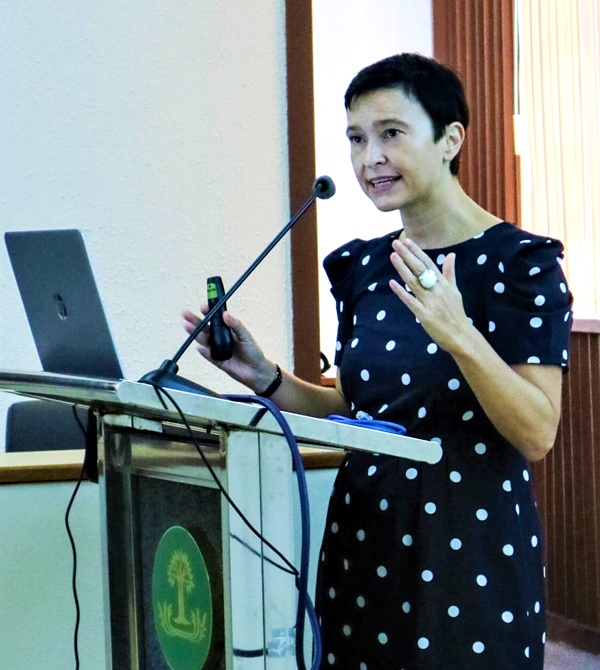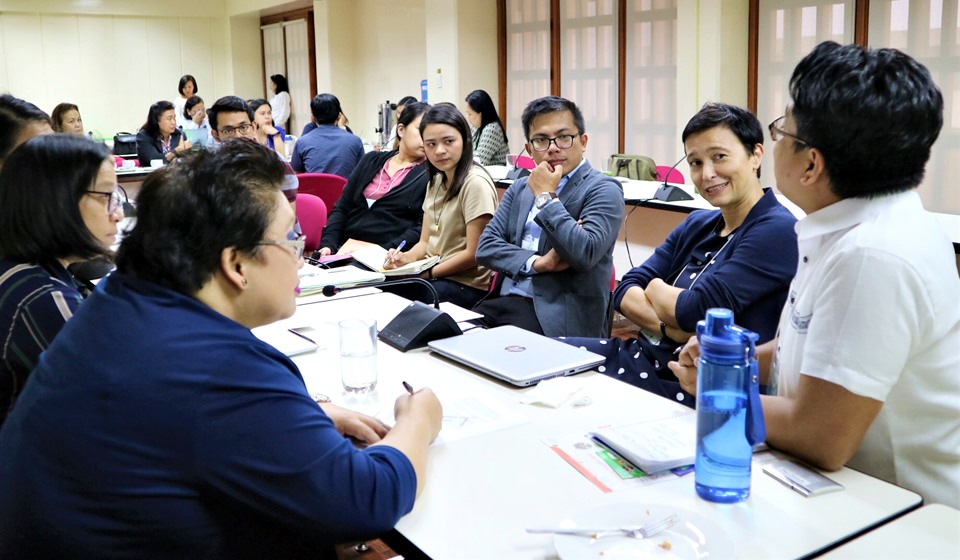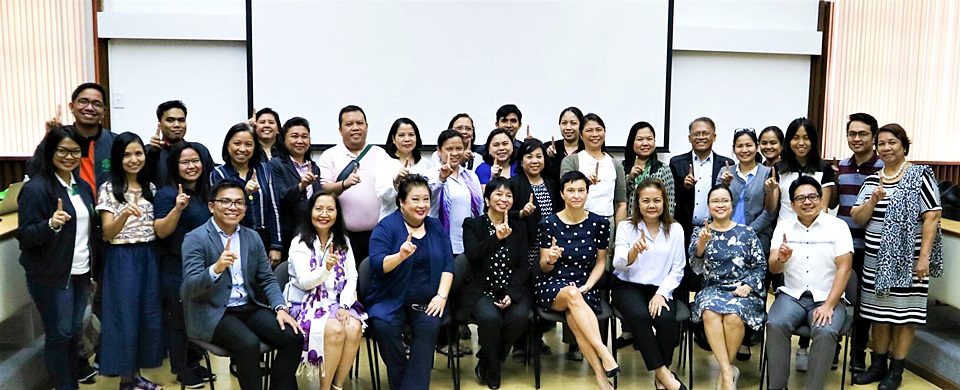Held on 25 October 2018 at SEARCA Headquarters, the Workshop on Applications of OneHealth Approach Towards Sustainable Livestock Production in Southeast Asia consisted of a public seminar on the basic concepts and current applications of OneHealth/EcoHealth and a workshop to discuss and add value to a draft program concept for operationalizing sustainability of the livestock sector for food security and livelihood in Southeast Asia through the OneHealth/EcoHealth approach.
 Dr. Flavie Goutard, GREASE Network Coordinator, expounds on the OneHealth/EcoHealth origins and approachDr. Flavie Goutard, GREASE Network Coordinator, discussed during the public seminar the theory and practice of OneHealth/EcoHealth and animal health in Southeast Asia, highlighting the concept of OneHealth/EcoHealth as a transdisciplinary approach that recognizes the interconnectedness of the biophysical, sociocultural, economic, and political spheres in understanding the epidemiological dynamics of human and animal populations. Dr. Goutard further elaborated on the multidisciplinary and cross-sectoral approach adopted by the GREASE Network for projects implemented in addressing issues regarding environmental management and rabies control in Thailand, in setting up an inter-ministerial platform to address parasitic food-borne diseases in Laos, and in combatting Japanese encephalitis in Cambodia.
Dr. Flavie Goutard, GREASE Network Coordinator, expounds on the OneHealth/EcoHealth origins and approachDr. Flavie Goutard, GREASE Network Coordinator, discussed during the public seminar the theory and practice of OneHealth/EcoHealth and animal health in Southeast Asia, highlighting the concept of OneHealth/EcoHealth as a transdisciplinary approach that recognizes the interconnectedness of the biophysical, sociocultural, economic, and political spheres in understanding the epidemiological dynamics of human and animal populations. Dr. Goutard further elaborated on the multidisciplinary and cross-sectoral approach adopted by the GREASE Network for projects implemented in addressing issues regarding environmental management and rabies control in Thailand, in setting up an inter-ministerial platform to address parasitic food-borne diseases in Laos, and in combatting Japanese encephalitis in Cambodia.
Via Skype streaming from Bangladesh, Dr. Hung Nguyen of the Regional Office of the International Livestock Research Institute in Vietnam underlined the four pathways where the livestock industry in Southeast Asia could contribute in meeting the United Nations Sustainable Development Goals. These pathways are economic growth, equitable livelihoods, nutrition and health, and ecosystem health.
Panel presentations on the current applications of OneHealth/EcoHealth framework in the Philippines also provided insights on previous and ongoing initiatives that employ the interdisciplinary approach in resolving problems of the country's livestock sector. Dr. Loinda R. Baldrias, Professor at the UPLB College of Veterinary Medicine, shared on the project titled "One Health: Innovations in Early Detection and Interventions in Human, Animal, and Plant Health," particularly on the mobilization of barangay health workers and the use of mobile technology (One Health App) in providing quick response to epidemiological issues arising in communities. Providing examples of the application of the OneHealth approach from the government's lens, Dr. Emerlinda L. Lopez of the Animal Health and Welfare Division of the Department of Agriculture-Bureau of Animal Industry (DA-BAI) presented the inter-agency collaborations they had undertaken that utilized the OneHealth approach in preventing and controlling zoonotic diseases, such as rabies, Ebola Reston virus, and Henipavirus. Dr. Rico C. Ancog, UP Scientist III and Assistant Professor at the UPLB School of Environmental Science and Management, discussed the results of a transdisciplinary study that used companion modelling in livestock management and rehabilitation of Calumpang River Basin in Batangas, Philippines. In a separate session during the workshop proper, Dr. Mary Grace B. Dacuma, Assistant Professor at the UPLB Institute of Biological Sciences, tackled the human health dimension of OneHealth and presented cases studies on various outbreaks of infectious diseases in the Philippines, including Henipavirus, avian influenza, and zoonotic malaria.
 Workshop participants discuss the research and development components of the OneHealth/EcoHealth program they plan to collaborate on
Workshop participants discuss the research and development components of the OneHealth/EcoHealth program they plan to collaborate on
Participants at the workshop included representatives from the academe, the private sector, agriculture and industry players, and relevant government agencies such as the DA-BAI and the Biodiversity Management Bureau of the Department of Environment and Natural Resources. Participants shared initiatives related to OneHealth implemented by their respective organizations and institutions.
As a final output of the workshop, participants worked together on putting flesh to a unified program draft on research and capacity-building that would operationalize the OneHealth/EcoHealth approach towards sustainability of livestock production for food and nutrition security in Southeast Asia. Future collaborations with academic institutions and government agencies were planned with regard to conducting baseline studies and research on market/supply chain and sociocultural aspects of OneHealth/EcoHealth as applied to livestock production in identified regions in the country. Initial steps identified as part of the program's capacity development component include the conduct of training and learning needs assessment, stakeholder mapping, and situation analysis; and a knowledge-sharing workshop that flows into research project planning and implementation along a seamless learning-by-doing approach. (Christian Ray Buendia)
